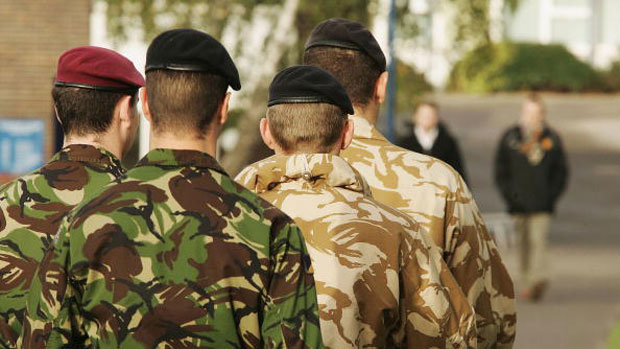Deepcut inquest: Army barracks 'failed in duty of care'
But there's no evidence to suggest that Cheryl James was unlawfully killed, coroner concludes

A free daily email with the biggest news stories of the day – and the best features from TheWeek.com
You are now subscribed
Your newsletter sign-up was successful
Deepcut barracks has been condemned by a coroner investigating the death of teenage Army recruit Cheryl James, who died from a gunshot wound at the Surrey base in November 1995.
Delivering his verdict in the long-awaited inquest, Brian Barker QC said the camp had failed in its duty of care to its young recruits and provided "insufficient" welfare support and daily structure.
However, there is no evidence to suggest that James was unlawfully killed, the coroner concluded.
The Week
Escape your echo chamber. Get the facts behind the news, plus analysis from multiple perspectives.

Sign up for The Week's Free Newsletters
From our morning news briefing to a weekly Good News Newsletter, get the best of The Week delivered directly to your inbox.
From our morning news briefing to a weekly Good News Newsletter, get the best of The Week delivered directly to your inbox.
The verdict marks the end of a 20-year battle for justice by the James family and could pave the way for further inquests into the unexplained deaths of three other Deepcut recruits.
"This case opens the doors for the other families to find out what happened to their children," Diane Gray, whose son was also found dead at the barracks, told the BBC.
What happened at Deepcut?
James from Llangollen, North Wales, was just 18 years old and undergoing initial training at Deepcut barracks when she was found dead with a bulletwound in her forehead. Her body was discovered in woodland outside the barracks, where she had been carrying out lone guard duty. An inquest into her death recorded an open verdict.
A free daily email with the biggest news stories of the day – and the best features from TheWeek.com
She was one of four young soldiers who died at the base between 1995 and 2002, provoking allegations of bullying, abuse and sexual harassment. The other three victims – Privates Geoff Gray, 17, Sean Benton, 20, and James Collinson, 17 – were all found with fatal gunshot wounds. The victims' families rejected suggestions their children had committed suicide and accused the Army of a cover-up.
"Bound by their tragedies, the families held a news conference [in 2002] where they called for a public inquiry," says the BBC. "It was the start of a long quest for the truth."
What happened after that?
A Surrey Police investigation concluded there was no evidence of third-party involvement, but James's parents were refused access to material uncovered by detectives. A later investigation by deputy High Court judge Nicholas Blake also rejected the families' calls for a public inquiry.
An inquest was finally approved in 2014, after civil rights group Liberty helped the James family unearth a large cache of new evidence. It threatened police with legal action under the Human Rights Act, forcing them to hand over secret documents relating to the teenager's death. Liberty said the files had never been properly examined and claimed the original inquest failed to call key witnesses, ignored important evidence and left medical records uninspected.
So what has the coroner ruled?
Detailing the list of failings at Deepcut, Barker said there were too few officers to train and monitor the young squaddies, who were left "bored and undisciplined".
With little to occupy them, a "sexualised" atmosphere soon developed, he continued, citing evidence of inappropriate relationships between commanding officers or instructors and trainees. During the inquest, the Army accepted some senior staff "saw young females as a sexual challenge".
However, allegations that James was ordered to have sex with another soldier were "wholly without foundation", said Barker.
Senior military officials, including Brigadier John Donnelly, the head of Army personnel, and Colonel Nigel Josling, Deepcut's commander at the time, have admitted "many and obvious inadequacies and shortcomings" at the barracks, Barker added.
"While some intermittent training was provided, there were too few permanent staff to deliver it and put into place a structured regime to occupy and meet a duty of care to those young men and women," the coroner added.
Deepcut was also criticised for breaking military rules by giving solitary guard duty to trainees as punishment. "It seems to me that lone armed guard duty is a potentially dangerous activity," Barker said.
The coroner concluded that it was "regrettable" that James's death was not better investigated at the time and praised her parents for their fight for justice.
"[I recognise] the patience and loving fortitude of Mr and Mrs James," he said. "They have waited for far too long for the proper examination of the circumstances of their daughter's death and it is clear to all they have devoted immense energy and devotion to that end."
-
 Political cartoons for February 14
Political cartoons for February 14Cartoons Saturday's political cartoons include a Valentine's grift, Hillary on the hook, and more
-
 Tourangelle-style pork with prunes recipe
Tourangelle-style pork with prunes recipeThe Week Recommends This traditional, rustic dish is a French classic
-
 The Epstein files: glimpses of a deeply disturbing world
The Epstein files: glimpses of a deeply disturbing worldIn the Spotlight Trove of released documents paint a picture of depravity and privilege in which men hold the cards, and women are powerless or peripheral